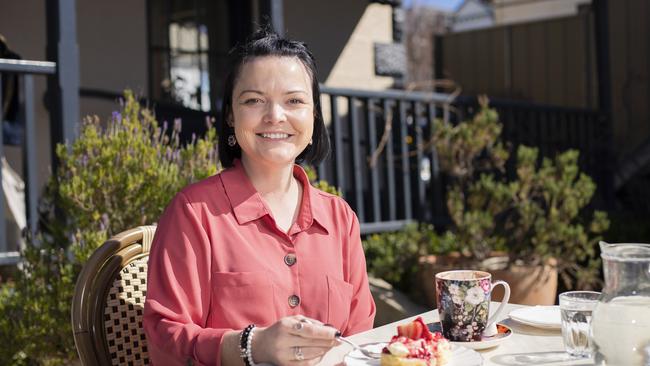Foster carers to receive more support from other families in new network
A foster care homes hub where families support one another is rolling out in Tasmania to combat desperate shortage of homes for children in need.

Lifestyle
Don't miss out on the headlines from Lifestyle. Followed categories will be added to My News.
ANDREA Senior jumped in at the deep end as a young counsellor fresh from university — her first job was at a maximum security men’s prison in Victoria.
There the 20-year-old was shocked to discover the preponderance of offenders who had spent time in out-of-home care as minors.
“It seemed a trajectory for a lot of them was to end up in prison,” says Andrea, who is the Southern Tasmania regional manager of Life Without Barriers, one of the state’s foster carer recruiters.
“Directly from that I became interested in out-of-home care. I felt like I was at the end of the road and I really wanted to get into prevention and early intervention.”
After 15 years in this often heart-wrenching area of social care, Andrea sees some promising shifts in out-of-home care, including more wraparound support leading to successful family reunifications.
Critical issues remain, though, including a desperate shortage of foster carers in the state and nationwide.
MORE CAFE SOCIETY:
JENNY DODD: TRAINING THE WORKFORCE OF THE FUTURE
ALISON STONE: VISION TO REMOVE CLASSROOM WALLS
MARGO ADLER: CITY SHOWS IT IS STREETS AHEAD IN SCIENCE
Why do so few people step up, I ask Andrea when we meet on the sunny cottage veranda of The Duchess Cafe in Sandy Bay.
She says many people exclude themselves from contention for unnecessary reasons, or simply delay the decision to get involved.
“People think they are not suitable or that they will do it down the track, when their children are all grown or when they are not working so much or when they finish their uni degree or whatever else.
“Our biggest message is that if you have room in your heart and your home, anybody can become a foster carer [subject to background checks and training].”
Statewide, about 1300 children are living in out-of-home care across formal kinship, foster care and residential care.
Though it is usually deemed the number one option, there are only enough foster carers to place 46 per cent of these children.
Excluding kinship arrangements, that leaves many children in residential care homes staffed by shift-workers. It’s just not the same.
Life Without Barriers supports about 80 placements in foster care, but Andrea says it could easily double that number if it had the carers to do so.
A critical shortage of primary foster carers is of particular concern, she says, taking the chance to spread the word during National Child Protection Week, on now, and Foster Care Week in Tasmania next week. Retaining carers is almost as challenging as recruiting them in the first place, but Andrea hopes the rollout of a peer-support program adopted by Living Without Barriers will help address the high attrition rate.
Called Mockingbird Family, it unites six to 10 foster and/or kinship carer homes in a local constellation around a hub home where an experienced carer provides respite care, and organises meetings, social gatherings and a range of other supports.
Andrea says children as well as carers stand to benefit in many ways from a community resembling an extended family network.
How lovely, she says, if children on respite care at the hub home feel they are just having a sleepover with family friends.
MORE CAFE SOCIETY:
ROD KNIGHT: DOWN AND DIRTY TO MEET EARTH’S DEMANDS
BRYAN WALPOLE: HEALTH SYSTEM NEEDS FULL REBUILD
KATHERINE STREET: FLOURISHING IN A CHANGING LANDSCAPE
I ask Andrea how the foster carer shortage tends to play out for the babies, children and teenagers who miss out on family-style foster placements.
She cites findings from a recent survey by the CREATE Foundation, the peak body representing the voices of almost 46,000 children and young people currently in care around the country.
These suggest that while about 96 per cent of young people feel safe and secure in foster, kinship and permanent care, only 69 per cent of young people in residential care feel safe and secure.
Life Without Barriers’ main out-of-home care focus is fostering, but it also operates seven residential homes in Tasmania.
Another positive shift in the sector is the provision of more support than previously to families of origin when their children return home.
“We are having success in transitioning people back home by providing a wraparound support service for the family,” says Andrea.
Today, more children remain in touch with members of their families during foster care, which happens for a range of reasons beyond the obvious ones of abuse and neglect.
Andrea says this is in line with a philosophical approach that preferences healthy family reunification over all other outcomes, and which aims to facilitate some family inclusion when children need to remain in care.
“We are seeing a lot more work done to restore those family networks,” she says.
“Ultimately those children are tied to their family for the rest of their lives.
“We only have them until they are 18, and they will always return home in some capacity or stay connected with their family of origin.
“If we can do everything we can to support those relationships to be positive and healthy, that’s what I see as being critical in the future.”
Interested in becoming a foster carer, even occasionally? Visit lwb.or g. au for more information.


